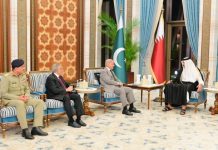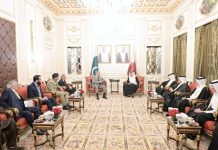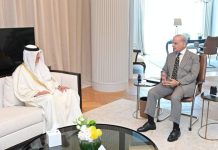
Staff Report
ISLAMABAD: Pakistan and India will sign the agreement on Kartarpur Corridor on Thursday (today), paving the way for its inauguration next month ahead of the 550th birth anniversary of the founder of Sikhism Guru Nanak Dev.
“As of now, Pakistan and India would sign the Kartarpur Sahib Corridor tomorrow,” Foreign Office spokesman Dr Muhammad Faisal said at the weekly media briefing on Wednesday.
The Indian External Affairs Ministry had on Monday announced that it was ready to sign the agreement on Oct 23. However, it has now been scheduled for Thursday.
The signing ceremony will take place at Kartarpur Zero Line.
The agreement would be made public. “We will share clause by clause details after signing of the agreement,” the spokesman said.
The agreement was finalised after three rounds of negotiations. The negotiations got protracted because of deep differences on various provisions of the agreement and at the same time Pulwama stand-off, Indian reservations over the composition of the committee set up to look after the affairs of the Corridor and elections in India also delayed the process.
The last sticking point was the $20 service fee that Pakistan would charge from every pilgrim for a single trip. However, India reluctantly agreed to it.
Pakistan is currently working out the mechanism for charging the $20 fee from the pilgrims.
Prime Minister Imran Khan will inaugurate the Corridor on November 9 after which visa free link between Darbar Sahib in Kartarpur and Dera Baba Nanak shrine in India’s Punjab will open for the pilgrims. The exact timings of the opening and closing of the shrine would be announced after the signing of the agreement.
On any day up to 5,000 Sikh pilgrims from India would use the corridor, while on special occasions greater numbers would be accepted depending on capacity.
The signing of the agreement is important becausethe two countries are doing it despite sharp deterioration in ties over Kashmir dispute.
Dr Faisal, in his briefing, underlined that the real issue was to resolve the Jammu and Kashmir dispute, as per the Resolutions of UNSC and the will of the Kashmiri people. “Until and unless this issue is resolved, the peace and stability in South Asia will remain elusive,” he added.
He said the diplomatic corps and members of foreign media during their visit to the Jura Town in Azad Kashmir were given an opportunity to speak to the locals and inquire about the unprovoked firing by Indian forces at Line of Control (LoC) that killed civilians and injured many others, including women and children.
He said that the Indian High Commissioner was requested to join the delegation and also share coordinates of their claim of a surgical strike, however, no response was made from their side so far.
Responding to a question about Pakistani efforts to mediate between Iran and Saudi Arabia, the spokesman said those were continuing.
He, however, avoided commenting on Saudi Minister of State for Foreign Affairs Adel al-Jubeir’s statement in which he had denied any mediation.
Mr Jubeir had said: “We are not having any mediation. People come to us with ideas and we give them our response and our response is what we would like the Iranians to do and that is it, and we would like to see actions rather than words.”
Dr Faisal said Pakistan would participate in the four-party meeting of China, Russia and the United States on Afghan peace process to be held in the Russian capital Moscow.
He said Pakistan had been part of all efforts and processes so far to discuss and facilitate peace and reconciliation efforts in Afghanistan. “Pakistan’s role is particularly noteworthy in crystalising international convergence for a peaceful resolution in Afghanistan,” he said. The spokesman said Pakistan would continue its efforts of “wholehearted support as it’s part of shared responsibility for making the international peace efforts successful in Afghanistan”.
Asked about Pakistan’s role in the intra-Afghan dialogue being held in China as claimed by a Taliban spokesman, he said he did not have an update on the matter.
The FO spokesman said Pakistan regarded the issue of Hong Kong as China’s internal matter and supported the ‘One China policy’.
About the statement of Malaysian prime minister Dr Mahathir Mohammad for supporting the Kashmir cause despite a ban put by India on import of palm oil, he said Pakistan was proud to have a brotherly Muslim friend like Malaysia.
On Indian threat of diverting inflow of water towards Pakistan, Dr Faisal said that under the Indus Water Treaty, to which the World Bank was a guarantor, India could not stop the water of three rivers.
He said if Pakistan’s right on the three rivers was questioned, the country had the right to take measures under the Treaty.



